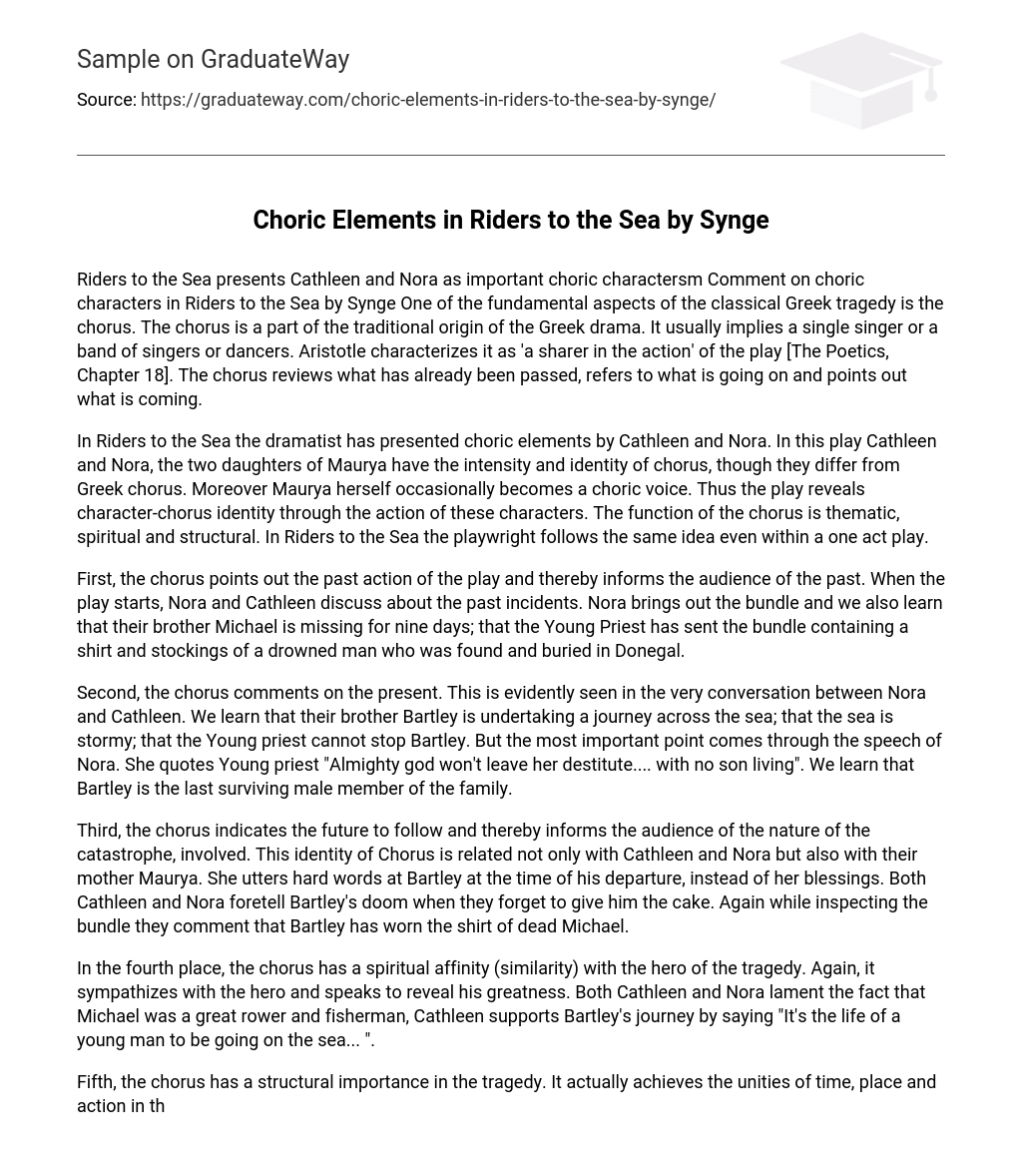Riders to the Sea presents Cathleen and Nora as important choric charactersm Comment on choric characters in Riders to the Sea by Synge One of the fundamental aspects of the classical Greek tragedy is the chorus. The chorus is a part of the traditional origin of the Greek drama. It usually implies a single singer or a band of singers or dancers. Aristotle characterizes it as ‘a sharer in the action’ of the play [The Poetics, Chapter 18]. The chorus reviews what has already been passed, refers to what is going on and points out what is coming.
In Riders to the Sea the dramatist has presented choric elements by Cathleen and Nora. In this play Cathleen and Nora, the two daughters of Maurya have the intensity and identity of chorus, though they differ from Greek chorus. Moreover Maurya herself occasionally becomes a choric voice. Thus the play reveals character-chorus identity through the action of these characters. The function of the chorus is thematic, spiritual and structural. In Riders to the Sea the playwright follows the same idea even within a one act play.
First, the chorus points out the past action of the play and thereby informs the audience of the past. When the play starts, Nora and Cathleen discuss about the past incidents. Nora brings out the bundle and we also learn that their brother Michael is missing for nine days; that the Young Priest has sent the bundle containing a shirt and stockings of a drowned man who was found and buried in Donegal.
Second, the chorus comments on the present. This is evidently seen in the very conversation between Nora and Cathleen. We learn that their brother Bartley is undertaking a journey across the sea; that the sea is stormy; that the Young priest cannot stop Bartley. But the most important point comes through the speech of Nora. She quotes Young priest “Almighty god won’t leave her destitute…. with no son living”. We learn that Bartley is the last surviving male member of the family.
Third, the chorus indicates the future to follow and thereby informs the audience of the nature of the catastrophe, involved. This identity of Chorus is related not only with Cathleen and Nora but also with their mother Maurya. She utters hard words at Bartley at the time of his departure, instead of her blessings. Both Cathleen and Nora foretell Bartley’s doom when they forget to give him the cake. Again while inspecting the bundle they comment that Bartley has worn the shirt of dead Michael.
In the fourth place, the chorus has a spiritual affinity (similarity) with the hero of the tragedy. Again, it sympathizes with the hero and speaks to reveal his greatness. Both Cathleen and Nora lament the fact that Michael was a great rower and fisherman, Cathleen supports Bartley’s journey by saying “It’s the life of a young man to be going on the sea… “.
Fifth, the chorus has a structural importance in the tragedy. It actually achieves the unities of time, place and action in the play. The chorus does not leave the stage during the whole action. In Riders to the Sea both Cathleen and Nora comment on these three unities. Their conversation indicates that the time of the play is day and not night. Time to time, Nora looks out to describe places like white rocks, green head, the turning of the hooker to suggest day activity. Again they also develop the action. In fact both the sisters never leave the stage. When Maurya goes out to hand over the cake to Bartley, Cathleen and Nora begin searching the bundle to ensure Michael’s identity. They keep up the tension of the play and fill up the time till Maurya enters again with her horrible vision that dead Michael is chasing Bartley.
Sixth, the chorus announces usually the entrances as well as exits of different characters. In Riders to the Sea Nora becomes the chief informer who tells others when Bartley is coming and when their mother is approaching. She also informs that people are carrying the dead body of Bartley and “water dripping out of it and leaving a track by the big stones”. Thus Riders to the Sea presents Cathleen and Nora as important choric characters. Without their participation the play could never unfold the truth of the play. Although the central character of the play is Maurya, yet these two girls continuously enrich the stage with their different emotions, mostly sad and thereby heighten the tragic mood of the play.





